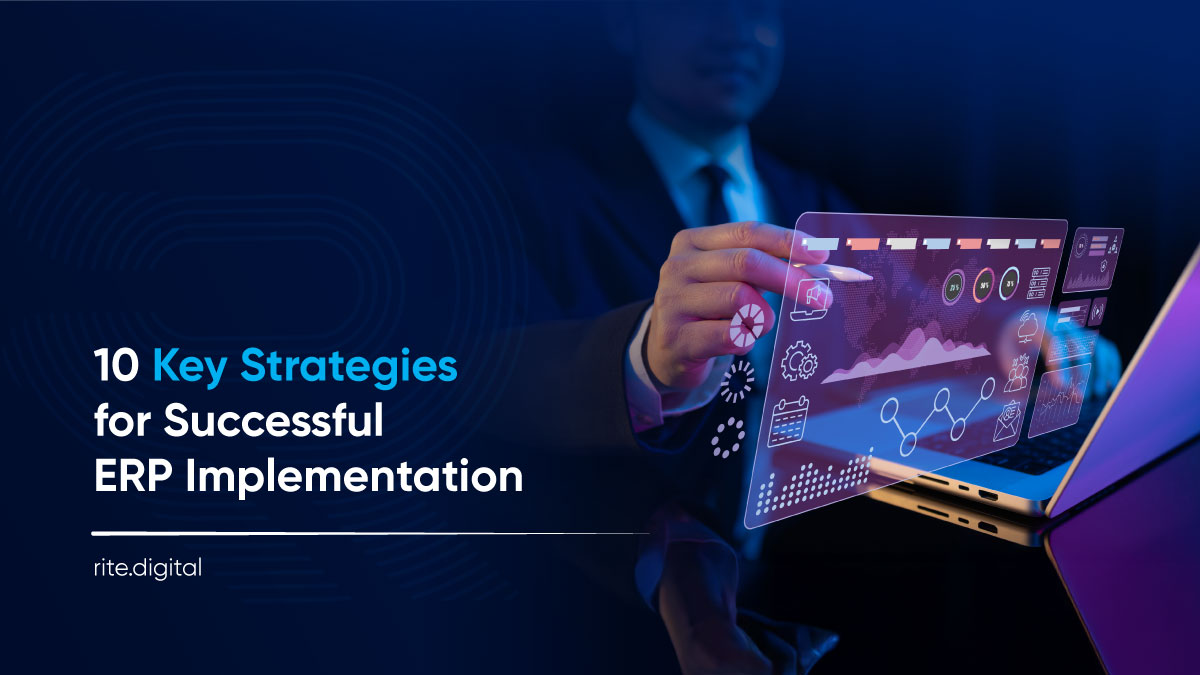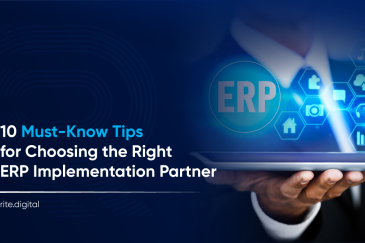10 Key Strategies for Successful ERP Implementation

- “It is a game-changer.”
- “It is a nightmare.”
Key Strategies for ERP Implementation Process:
1. Set Clear, Realistic Goals
Before acting upon the main process, being clear on “why are we doing this?” would help. Talk it through with your team. It sets the tone for everything that follows.
- What problems are we solving with new ERP?
- Is it a tech issue or a process issue?
- What would success actually look like after implementation?
This clarity shapes every future decision from vendor selection to training.
2. Choose the Right ERP Implementation Partner
You’re not investing in a tool, you’re starting a partnership. ERP isn’t plug-and-play. You’ll need ongoing support, guidance, and fixes. So, pick a partner who is not just demo-ready but battle-tested in your industry.
- Ask for examples, not just credentials.
- Make sure they challenge your assumptions, not just nod along.
3. Involve Stakeholders Early On
This is the step where many ERP projects go off track. Finance, HR, Supply Chain, and Ops all need to be at the table from the start. Not just informed but involved.
Because if you roll out a system that doesn’t reflect how they actually work? They’ll find workarounds faster than you can say “go-live.”
4. Document What Works (and What Doesn’t)
Before ERP, how did things get done? What is working? What is clunky?
Map it. Not just the process flows, but the exceptions and manual hacks that make things function. Then design your ideal future workflows. If you skip this, you’ll just replicate old problems in a shinier interface.
5. Focus on Data Quality
This part often feels boring, but it is where the most damage can happen.
- Bad customer records
- Duplicate vendors
- Outdated product info
Clean it all up before you migrate. That means:
- Removing junk entries
- Standardizing naming
- Validating accuracy
6. Take Change Management Seriously
Even the best ERP system will flop if people don’t use it right.
The resistance is real and often silent. You won’t always hear “I hate this.” You’ll see it in dropped tickets, offline spreadsheets, and frustrated team leaders.
Here is what helps:
- Frequent, honest updates
- Training that is contextual (real roles, real workflows)
- On-call support for the first few weeks
- Recognizing effort, not just outcomes
8. Prioritize User Training and Support
Adopting the new ERP systems might be a bit tricky at first. People learn by using the system practically, not by attending a single 3-hour session.
- Offer role-specific training
- Use short how-to guides, not just long manuals
- Record quick screen-share walkthroughs
- Encourage peer-to-peer learning
Ensure there is support available post-go-live.
9. Test Before You Go Live
Testing is the next crucial step to verify whether the chosen ERP system supports your real-world business processes.
Run real-life tasks:
- Can the Finance team process invoices?
- Can Procurement approve POs?
- Can the warehouse track stock accurately?
Invite team leads to try it. That is when the gaps will show, and it is best to fix them ahead of time if any.
10. Don’t Consider Go-Live as the End
Here is a big mindset shift: Going live is just the beginning. Your ERP will evolve with new processes, tweaks, and integrations. Build a rhythm of review:
- Monthly check-ins
- Feedback loops
Training refreshers
Additional Tips to Remember!
- Start by implementing the system in a single department. Extend it to other people after your team is comfortable and everything is in order.
- Update process flows, system configurations, and any custom modifications regularly to ensure optimal performance. Later on, it will save confusion and time.
- Establish go-to individuals in the organization. When necessary, they can assist new users and promptly fix minor problems.
Conclusion
ERP can be the best decision you make if it is backed by practical planning and real-world thinking. Whether you’re partnering with an ERP solutions provider or considering switching systems, the initial planning and groundwork will determine the success of your ERP deployment. The key strategies highlighted will be helpful for any ERP journey, regardless of a business’s industry, size, or technology used. So, take your time and talk to your teams thoroughly before proceeding.

Copyright © 2025 Rite Software Solutions & Services LLC. All rights reserved.



